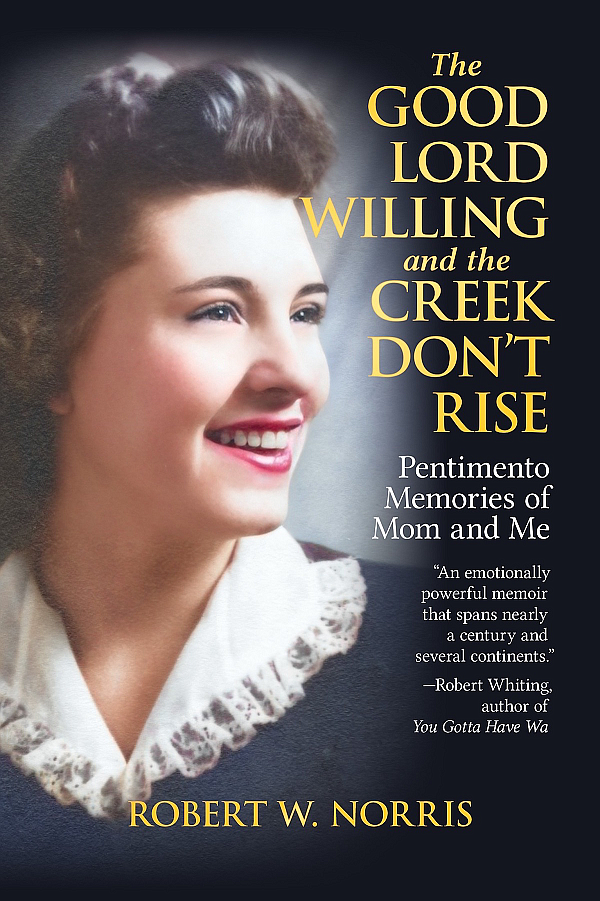White Salmon Days
January 25, 2023 at 8:18 a.m.
Robert Norris’ new memoir starts with his mother: Family was everything to Mom, he writes.
This sweeping true-life tale spans nearly one hundred years and begins long before Norris was born. His book, The Good Lord Willing and the Creek Don't Rise: Pentimento Memories of Mom and Me, explores his own life alongside his mother’s time on earth.
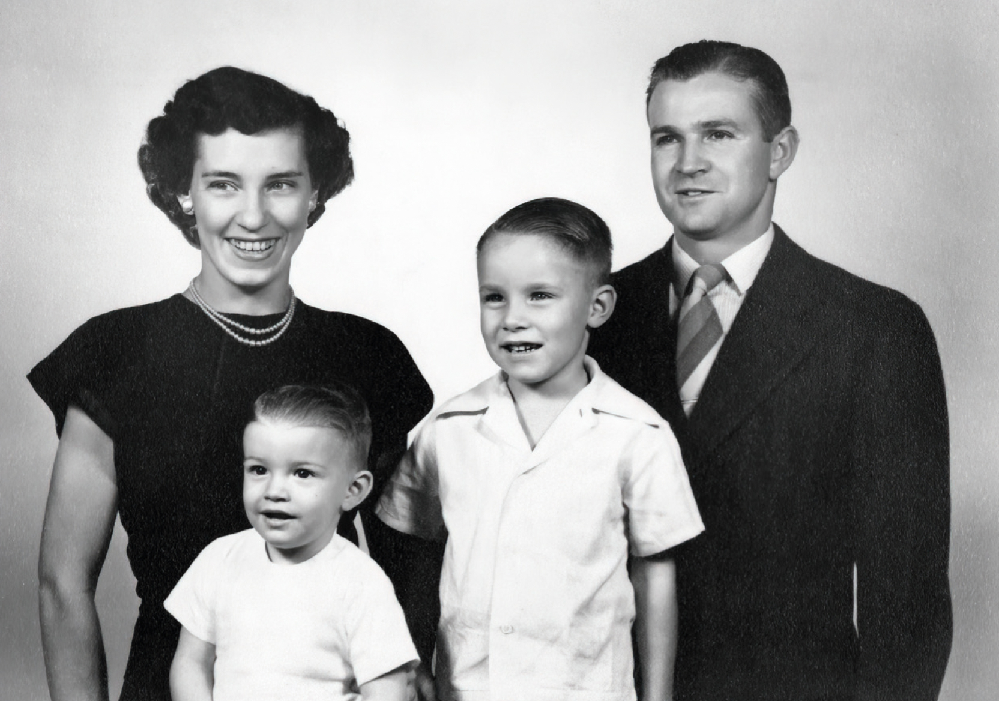 Robert Norris as a kid with his family:
Robert Norris as a kid with his family:
(the author with his family in 1952,
he is the child on the left)Her childhood memories in a small town by the Columbia River come alive through the stories he tells. His grandparents and his mom’s Grandad Frederick become larger than life characters, showing how his mother’s loving nature, strength, moral character, perseverance, fortitude, stubbornness, pride, and mischievous sense of humor were born.
By any reckoning, Norris’ mother, Catherine Caroline Murphy Schlinkman, was a memorable woman. Her obituary outlined some of the basics: A world traveler who enjoyed music, painting, golf, writing, and dancing. Although she spent most of her career as a legal secretary, she was also a roller-skating instructor, got a pilot’s license and flew fire patrol for the forest department. She traced her family’s roots in Ireland and began studying the Japanese language in her 60s.
But these facts didn’t capture his mother’s spirit for Norris. She was so much more than that. In many ways, Mom’s life is the story of a remarkable American woman, a fighter, and a survivor of the time in which she lived. As a child, her experience of traveling across the United States with her family in the early days of the Great Depression was not unlike that of the Joad family in Steinbeck’s The Grapes of Wrath. Being ostracized by a small logging community in the late 1950s for her divorce and later being kicked out of the Catholic Church when she remarried were symbolic experiences. When I became a conscientious objector, refused my order to fight in the Vietnam War, got court-martialed, and spent time in a military prison, Mom bravely defended me against patriotic and conservative friends, colleagues, neighbors, and family members who considered me a coward and a traitor. This courage also exemplified her life, he writes.
She once wrote to her son: “I know when I had you three children, my main purpose in life was to raise you to be free spirits, independent, adventuresome, self-confident, and perhaps most of all to be very self-sufficient.” Her love was true, writes Norris. He describes her hugs as strongest and best in the world.
Norris views his mother as a feminist ahead of her time who fought against sexual harassment in the home and workplace. After her first divorce, she mowed lawns, cleaned houses, and did others’ laundry to feed her children. After her second divorce, in addition to her main day job as a legal secretary, she took on two part-time jobs to pay off thousands of dollars in gambling debts her second husband left behind. She didn’t have money for gas during this time, so she bicycled to work in the snow.
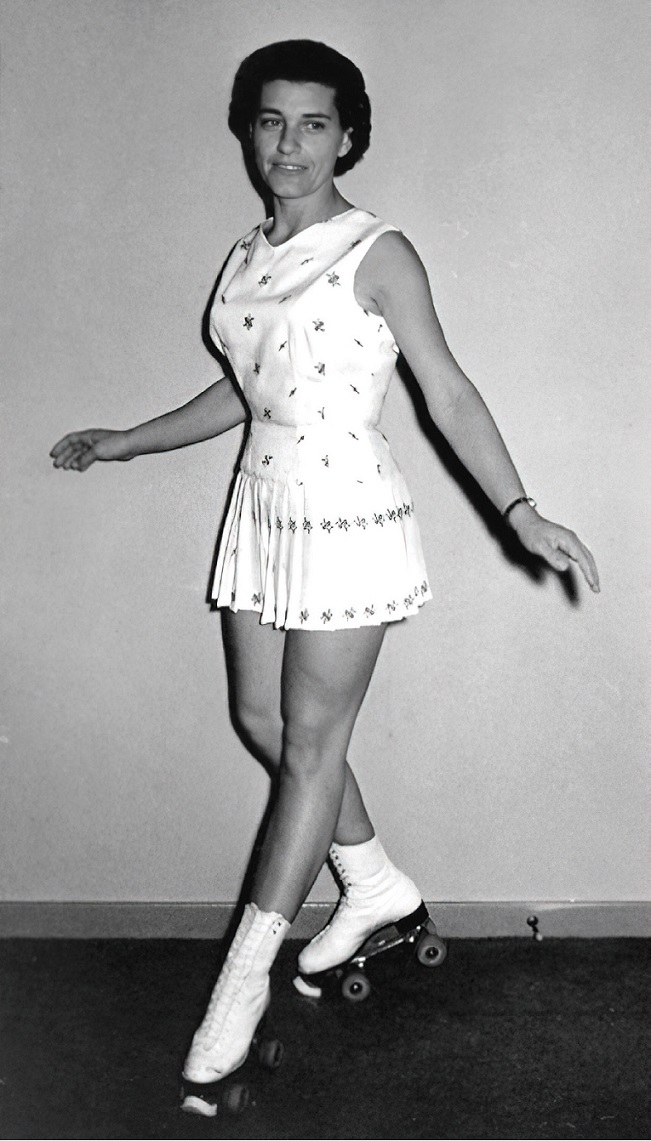 The author's mother had several jobs to make ends meet, including time spent as a roller-skating instructorDespite working so hard throughout her life, not retiring until age 78, Norris writes: Mom was an artistic soul who painted, wrote poetry and played the piano for social gatherings. She was an athlete who, in addition to her high school cheerleading and majorette activities, played golf, umpired Little League games, bowled in a city league, water-skied, roller-skated, practiced aerobics, did a lot of mountain trekking. In short, she was a ball of energy.
The author's mother had several jobs to make ends meet, including time spent as a roller-skating instructorDespite working so hard throughout her life, not retiring until age 78, Norris writes: Mom was an artistic soul who painted, wrote poetry and played the piano for social gatherings. She was an athlete who, in addition to her high school cheerleading and majorette activities, played golf, umpired Little League games, bowled in a city league, water-skied, roller-skated, practiced aerobics, did a lot of mountain trekking. In short, she was a ball of energy.
Norris’ memoir encompasses his own life, including an idyllic childhood growing up in the redwood forest of Humboldt County, California. That childhood was shattered at the age of 11 when his parents divorced, the beginning of very tumultuous times. After high school he joined the Air Force only to become a conscientious objector to the Vietnam War, which landed him in military prison. He left that experience behind by becoming part of the counterculture movement and roaming the world. He finally found himself in Japan, began a career at a university there, and retired as professor emeritus.
 After a tumultuous life, the author landed in Japan, where he met his wife. Here they are on their honeymoon at Oregon's Multnomah FallsDespite his own memorable life, the impulse to write the memoir came from wanting to preserve the essence of his mother, to create a lasting tribute to her. He writes: During the last month of Mom’s life, she often fretted about her loved ones forgetting her. “Please don’t forget me,” she implored... It was hard to convince her that we wouldn’t. If Mom is up there in heaven and still worried about that, here’s what I’d like to say to her: Mom, no one who ever met you could possibly forget you. Believe me, we’ll always remember, love, and cherish you. We’ll always remember your infectious laugh, your warmhearted hug, and your family stories. Oh, those stories. That’s why I wrote this book!
After a tumultuous life, the author landed in Japan, where he met his wife. Here they are on their honeymoon at Oregon's Multnomah FallsDespite his own memorable life, the impulse to write the memoir came from wanting to preserve the essence of his mother, to create a lasting tribute to her. He writes: During the last month of Mom’s life, she often fretted about her loved ones forgetting her. “Please don’t forget me,” she implored... It was hard to convince her that we wouldn’t. If Mom is up there in heaven and still worried about that, here’s what I’d like to say to her: Mom, no one who ever met you could possibly forget you. Believe me, we’ll always remember, love, and cherish you. We’ll always remember your infectious laugh, your warmhearted hug, and your family stories. Oh, those stories. That’s why I wrote this book!
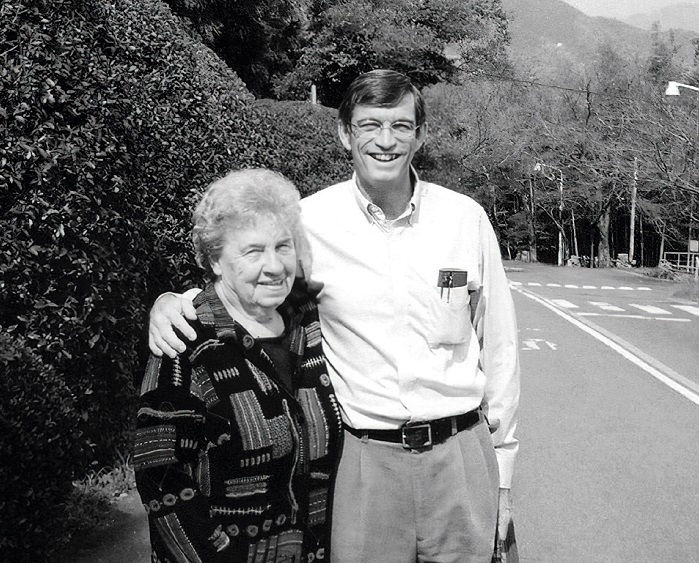 His mother on one of her visits to Japan, near the university where he workedA few of his mom’s stories from White Salmon, Washington:
His mother on one of her visits to Japan, near the university where he workedA few of his mom’s stories from White Salmon, Washington:
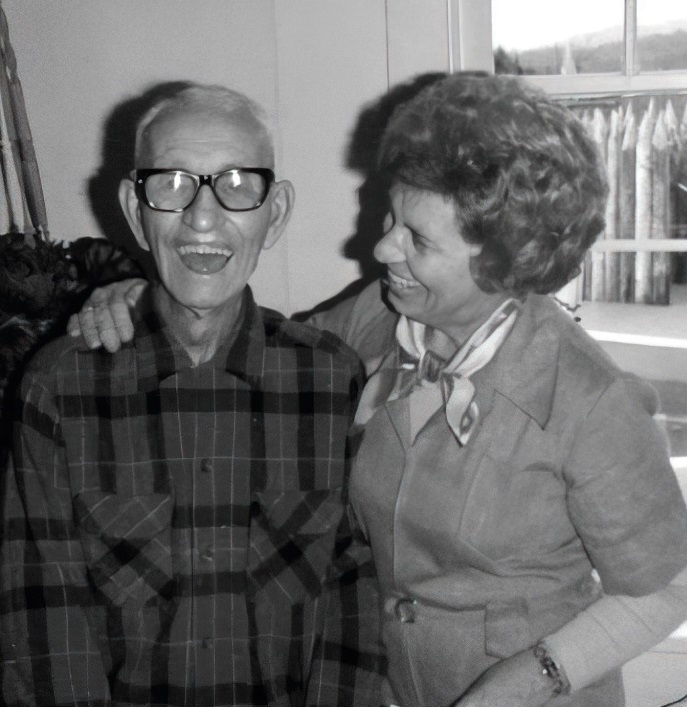 The author's mother with her Granddad Frederick
The author's mother with her Granddad Frederick
Norris said, “My purpose in writing this story was to try to evoke the importance of family bonds in helping us overcome difficult times and to remind people not to be afraid of the unknown. I believe it’s a good book for not only mothers and sons but also for people who’ve wondered what the road less traveled would’ve been like had they just taken that first step. I hope readers come away from it with a positive feeling.”
He writes: On January 11, 2021, my seventieth birthday, Mom fell into a coma. Three days later and four days short of her ninety-fifth birthday, she died peacefully. My sister Terri was at her side. I felt a deep emptiness and loneliness that still lingers. I was once again a lost little boy who couldn’t find his mama to run to for warmth and comfort.
Norris answered that loss and yearning by writing his book, The Good Lord Willing and the Creek Don't Rise: Pentimento Memories of Mom and Me.
Robert W. Norris is the author of three novels, a novella, a memoir, and over 20 research papers on teaching. He and his wife live near Fukuoka, Japan. Excerpts and photos from the book are reprinted with permission.
This sweeping true-life tale spans nearly one hundred years and begins long before Norris was born. His book, The Good Lord Willing and the Creek Don't Rise: Pentimento Memories of Mom and Me, explores his own life alongside his mother’s time on earth.
 Robert Norris as a kid with his family:
Robert Norris as a kid with his family: (the author with his family in 1952,
he is the child on the left)
By any reckoning, Norris’ mother, Catherine Caroline Murphy Schlinkman, was a memorable woman. Her obituary outlined some of the basics: A world traveler who enjoyed music, painting, golf, writing, and dancing. Although she spent most of her career as a legal secretary, she was also a roller-skating instructor, got a pilot’s license and flew fire patrol for the forest department. She traced her family’s roots in Ireland and began studying the Japanese language in her 60s.
But these facts didn’t capture his mother’s spirit for Norris. She was so much more than that. In many ways, Mom’s life is the story of a remarkable American woman, a fighter, and a survivor of the time in which she lived. As a child, her experience of traveling across the United States with her family in the early days of the Great Depression was not unlike that of the Joad family in Steinbeck’s The Grapes of Wrath. Being ostracized by a small logging community in the late 1950s for her divorce and later being kicked out of the Catholic Church when she remarried were symbolic experiences. When I became a conscientious objector, refused my order to fight in the Vietnam War, got court-martialed, and spent time in a military prison, Mom bravely defended me against patriotic and conservative friends, colleagues, neighbors, and family members who considered me a coward and a traitor. This courage also exemplified her life, he writes.
She once wrote to her son: “I know when I had you three children, my main purpose in life was to raise you to be free spirits, independent, adventuresome, self-confident, and perhaps most of all to be very self-sufficient.” Her love was true, writes Norris. He describes her hugs as strongest and best in the world.
Norris views his mother as a feminist ahead of her time who fought against sexual harassment in the home and workplace. After her first divorce, she mowed lawns, cleaned houses, and did others’ laundry to feed her children. After her second divorce, in addition to her main day job as a legal secretary, she took on two part-time jobs to pay off thousands of dollars in gambling debts her second husband left behind. She didn’t have money for gas during this time, so she bicycled to work in the snow.
 The author's mother had several jobs to make ends meet, including time spent as a roller-skating instructor
The author's mother had several jobs to make ends meet, including time spent as a roller-skating instructor
Norris’ memoir encompasses his own life, including an idyllic childhood growing up in the redwood forest of Humboldt County, California. That childhood was shattered at the age of 11 when his parents divorced, the beginning of very tumultuous times. After high school he joined the Air Force only to become a conscientious objector to the Vietnam War, which landed him in military prison. He left that experience behind by becoming part of the counterculture movement and roaming the world. He finally found himself in Japan, began a career at a university there, and retired as professor emeritus.
 After a tumultuous life, the author landed in Japan, where he met his wife. Here they are on their honeymoon at Oregon's Multnomah Falls
After a tumultuous life, the author landed in Japan, where he met his wife. Here they are on their honeymoon at Oregon's Multnomah Falls
 His mother on one of her visits to Japan, near the university where he worked
His mother on one of her visits to Japan, near the university where he worked
- Watching Native Americans fish at Celilo Falls which later disappeared when the Dalles Dam was built on the Columbia River. “It was quite a sight. I think I was probably nine or ten at the time. Grandad said to me, I want you to see how the Indians fish. They didn’t have any safety ropes tied to them or anything... Oh my, and the fish were huge.” Her grandfather emphasized that everyone should respect the native culture and feel very privileged by their interactions with the local Indian community.
- How Grandad Frederick kept up his Japanese-American neighbors’ property, the Kidas, after they were taken away to an internment camp during WWII. “When they were released and came back to see what happened to their property—I don’t think they expected anything—but there it was and my grandad met them and said, I tried to keep your place clean for you.’” Mom beams with pride, writes Norris. “…I think if anybody would’ve been mean to the Kidas, they would’ve had to put up with grandad. He was a staunch believer in ‘treat people nicely so that you’ll be treated nicely’ and ‘if you want to learn to do something, you learn the right way.’”
- One story was about her grandfather’s love of animals – “You know, thinkin’ about Granddad and that time reminds me now of the time he went to Pennsylvania and one of his calves started grievin’ and wouldn’t eat.” It all started because of a trip back home. “After everyone came to White Salmon and got settled, Granddad’d often say, Gosh, I was born in Pennsylvania and that’s way across the U.S. I don’t think I’ll ever see Union County, Pennsylvania again. One Christmas, everyone in the family decided to pitch money into the pot for him to take a trip to Pennsylvania. We raised enough money for an airplane ticket, which in those days was very excitin’... Anyway, we collected enough money. Then the big decision was Granddad not wearin’ a tie on the plane.” But as it turned out, Grandad Frederick had to cut short the biggest trip of his life to come home and care for that grieving calf who missed his daily attentions. “Wouldn’t you know, the calf started eatin’ the minute it saw my granddad!”
- She related the story of the time her Granddad lost his dentures while floating logs down the Columbia River to Portland, like in the movie Sometimes a Great Notion starring Henry Fonda and Paul Newman… “So there they were out on the water walkin’ on the logs and suddenly Granddad sneezed and his teeth came out—They went into the river and he says. Oh my God. There goes my teeth! And he dove in after them, but he wasn’t able to retrieve them… Uncle Jack was petrified. Well, somehow Uncle Jack got him out of the water. He was soakin’ wet in his clothes and those cork boots.” Her granddad made his way home, but… “He went to his room and he wouldn’t come out. He said, You get ahold of Dr. Kloster the dentist and tell him I want a new set of teeth today. Uncle Jack said, ‘Well, he has to take a mold—’ Granddad cut him off and said, I don’t care. If he has any spare ones, bring ’em out. I don’t know what happened, but he did get a new set of teeth… That was another story that made all the rounds in the family.”
 The author's mother with her Granddad Frederick
The author's mother with her Granddad Frederick
- On dating: Her aunt and uncle had a telephone and allowed her to use their number to receive calls between 5 o’clock and 5:15, no more. That’s the only time a boy could call her. “Of course. I’d go over there at five o’clock and some nights the phone would ring and some nights it wouldn’t. But if we were in the middle of a conversation and it was 5:15, my uncle would come and without sayin’ anything, just click, the call’s over. And so I got to the point where I said, ‘OK. You can call me between five and 5:15, but make a list of what you wanna talk to me about.’ So here we are. Very romantic. ‘What’s on your list?’ ‘Can you go to the movies with me Saturday night?’ My turn to talk. ‘Do you have enough gas to drive from your place out here? Or do I have to ride the bike and meet you at the movie theater?’ This one kid called me and said, ‘Would you like to go to the movie Saturday night?’ That was all there was to do. ‘Well, yes. Do you have any money for gas?’ ‘No, but I’ll pick you up on my bicycle.’ ‘Oh. OK. That means I’ll have to wear pants, not a dress.’ ‘That’s right.’ So he’d pick me up on the bike and I’d ride on the handlebars into town, which was about a mile. And that way we’d save money for a coke.”
- Norris’ mother loved high school, in part because she loved being a cheerleader and a drum majorette but also because she became flush with cash. “High school was a great time for me. What a rich, young thing I thought I was.” Not only did she earn money the summer of her junior year of high school as a fire lookout living in the tower all on her own, “But I also had three part-time jobs. I ushered at the local movie theater one night a week and on Sundays; I did some bookkeepin’ for a local feed store two afternoons a week—my desk was a piece of plywood on top of some bales of hay; and I worked in the fruit orchards on weekends when fruit was in season. Oh my, I thought I was so rich. And I even had my own bank account!” Mom pretends to count money with her fingers, grins at me, writes Norris.
- His mother recalls an exciting event taking place in Portland. “One year, our little high school band was invited to march in the Rose Festival Parade in Portland. I was one of three drum majorettes and were we ever excited. I even used some of my hard-earned money to buy a pair of white boots to wear with my short outfit. Of course, my dad thought it was way too short, but we three girls were so excited and we were gonna get to stay overnight in Portland and after the parade were invited to one of the high school dances. We thought we were in heaven— but alas! After marchin’ for five miles with the band, we all three had big blisters on our feet and our chaperone wouldn’t let us go to the dance. The three of us thought that life had absolutely come to an end! It was still a thrillin’ experience for us country bumpkins. I usually remember that when Rose Festival time comes around and I have to laugh at how innocent and naive we were.”
- After his mother graduated from high school in 1943: “I went to a Portland business school. My folks couldn’t afford to pay for college. But I thought, ‘OK. I get to go to Portland. I think I’ll find another girl who’s goin’ to Portland and we’ll get an apartment together.’ And they had what they called the U.S.O., the United Service Organization, for the soldiers and sailors and you’d go down and dance with them. My dad said, ‘Don’t think you’re gonna get your own place to live and just have a big time. You’re gonna go to school and you’re gonna stay with your aunt and uncle, who have the same ground rules we have at home.’ I thought, ‘How did he know what I was thinkin’?’ And my aunt and uncle were very strict. Then I went back to White Salmon before I interviewed for jobs.”
- After secretarial school in Portland: “Then I went back to White Salmon and I worked. I stayed with my folks and then they had a reunion or, no, a homecoming basketball game in the gym and your dad and Uncle Dick came. Your dad had his uniform on, his Army uniform on, really handsome. And I had my little short cheerleadin’ costume on and boy I jumped around when I saw these two guys up in the audience because all there was up there was older mothers and fathers and grandmas and grandpas. Whoaaa!” Mom throws her arms out to the side and pretends to wave some pompoms around. “And I thought, ‘Oh my. I’ve jumped from cheerleadin’ and jumpin’ around to a proper finishin’ school.’ And the next thing I knew, we were married and on our way to California.”
- Advice from her father and grandfather: ‘Sis,’ her father said, ‘when you think you’re goin’ through what you perceive at the time to be a very difficult situation, don’t waste time and energy askin’ “Why?” or “Why me?” or complainin’. Life is simply helpin’ you build character and you’ll need a lot of character and stamina if you’re to survive, and if you can survive and learn to be kind to others and learn to laugh, then and only then will you have a good and fulfillin’ life.’ “He really had a strong impact on my life,” his mother told Norris. “He gave me a deep appreciation for everything we had and where we lived. Granddad Frederick, too. Granddad often used to say to me, ‘Sis, don’t ever forget this beautiful area where you were privileged to live durin’ your growin’ up years.’”
- Upon hearing how they had to portion out oranges at Christmastime as special gifts, Norris pointed out to his mother that there were many tough times during her White Salmon days. “But fun times,” his mother replied. “It was just great…it was a fun time to grow up. We didn’t have very much, but we had each other.”
Norris said, “My purpose in writing this story was to try to evoke the importance of family bonds in helping us overcome difficult times and to remind people not to be afraid of the unknown. I believe it’s a good book for not only mothers and sons but also for people who’ve wondered what the road less traveled would’ve been like had they just taken that first step. I hope readers come away from it with a positive feeling.”
He writes: On January 11, 2021, my seventieth birthday, Mom fell into a coma. Three days later and four days short of her ninety-fifth birthday, she died peacefully. My sister Terri was at her side. I felt a deep emptiness and loneliness that still lingers. I was once again a lost little boy who couldn’t find his mama to run to for warmth and comfort.
Norris answered that loss and yearning by writing his book, The Good Lord Willing and the Creek Don't Rise: Pentimento Memories of Mom and Me.
Robert W. Norris is the author of three novels, a novella, a memoir, and over 20 research papers on teaching. He and his wife live near Fukuoka, Japan. Excerpts and photos from the book are reprinted with permission.
